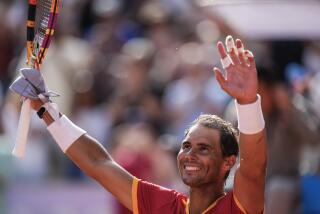In India, It’s Honor to Play in Davis Cup
- Share via
NEW YORK — Told that Arthur Ashe had resigned as captain of the U.S. Davis Cup team, Indian tennis star Vijay Amritraj just shook his head.
“I can’t understand it,” said Amritraj, referring to the U.S. Davis Cup squad, not Ashe’s resignation. “How can you not have your best players playing for your country.”
With John McEnroe and Jimmy Connors, America’s top players, not on the team, the United States was eliminated by West Germany in this year’s Davis Cup quarterfinals.
“It’s such an honor to play for your country,” said Amritraj, the captain of India’s Davis Cup team who has played in the international team championships for the past 16 years.
Unlike the United States, India always fields its best players for Davis Cup. The problem, Amritraj admits, is that India doesn’t have that many world-class players, and those they have are getting older.
This year, the Indian Davis Cup squad was made up of Vijay, who will turn 32 in December; his brother Anand, 33; Sashi Menon, 33, and Ramesh Krishnan, the youngest at 24 who is ranked 31st in the world.
With Vijay and Anand on the team, India did reach the Davis Cup final in 1974, defeating the Soviet Union and Australia. But the Indian government boycotted the final against South Africa due to the South African government’s policy of apartheid.
In 1986, India again will be in the 16-nation World Group, the only countries actually competing for the Cup.
“Whenever I play well, I figure the future of India’s Davis Cup team is in good shape,” Amritraj said. “Then, when I lose a match I should have won, or when I play poorly, I worry about the future of the team.”
It was that worry that led Amritraj and his brothers, Anand and Ashok, to form a tennis training academy in Madras, India.
“I started to think about replacing myself on the team,” said Vijay, who once was ranked in the top 20 in the world. “There are no public tennis courts in India--nothing available for the average person to go to play.
“You have to be a member of a club or a school. That’s why it’s very difficult for us (players from India) to compete.”
Teaming up with Britannia Industries Limited, the Indian associate of Nabisco Brands Inc., the Amritraj brothers began a program to discover and develop young tennis talent in India.
“We picked 30 boys under the age of 14. We--Anand and myself--played with all of them, then picked the best eight: three from Bombay, one from New Delhi, one from Hyderadad and three from Madras.
“Basically, we’ve taken over their entire lives. We moved them to Madras, where we have three coaches, two Americans and one Indian.” Madras also is the Amritraj home.
The boys are housed, and their diets and physical training are watched as closely as their tennis.
“Most important, their education is not being neglected,” Vijay said.
Then, Vijay said, came the most important task.
“The boys are all young, so we had to find somebody to take care of them, somebody to administer the academy.
“There was only one person I could think of to do it and had complete trust in: my mother,” Vijay said. “After all, she took care of the three of us, so what’s eight boys?
“We picked the 14-and-under players because it gives them three years to get ready for the junior (boys tournament at) Wimbledon. Their only commitment to us is that if they become good enough, they must play Davis Cup for India.”
In order for BAT--Britannia Amritraj Tennis--to become a reality, the Indian government also had to give its approval since the boys will be admitted to the central school in Madras.
“They will be studying what they want to achieve and what their parents want them to achieve,” Vijay said. “We will give them all the opportunity. They will be in special classes, and instead of attending games periods in the school, they will be coming back early to the foundation to play tennis for at least three to four hours in the afternoon.”
Known for his gentlemanly behavior on and off the court, Vijay hopes to instill the same attributes in his charges.
“We are emphasizing the importance of being in the public eye. When I walk out on the court, everyone knows I’m from India. What I do, and the way I act reflects on all Indians.”
For that reason, court deportment will be stressed as much as tennis strokes. “And they will not be allowed to have long hair or to put on torn jeans,” Vijay said.
More to Read
Go beyond the scoreboard
Get the latest on L.A.'s teams in the daily Sports Report newsletter.
You may occasionally receive promotional content from the Los Angeles Times.










